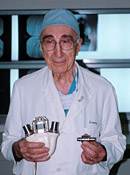
Michael DeBakey
1908-2008
Former Member of the National Space Society Board of Governors
Michael E. DeBakey, M.D., was chancellor emeritus of Baylor College of Medicine, and director of The DeBakey Heart Center of Baylor and the Methodist Hospital.
DeBakey’s surgical career earned him world renown as a surgeon, innovator, medical educator, and international medical statesman.
While still a medical student, he devised a pump that, years later, became one of the essential components of the heart-lung machine that made open-heart surgery possible. He developed more than 50 surgical instruments.
Best known for his innovations in treating cardiovascular diseases, DeBakey was the first to do successful excision and graft replacement of arterial aneurysms and obstructive lesions, particularly on the carotid artery and aortic arch. A pioneer in the development of an artificial heart, he was the first to use a heart pump successfully in a patient. He also conceived the idea of lining a bypass pump and its connections with Dacron velour.
In 1953, DeBakey performed the first successful carotid endarterectomy, thereby establishing the field of surgery for strokes. In 1964, DeBakey and associates performed the first aortocoronary bypass with autogenous saphenous vein graft. In 1968, he led a team of surgeons in an historic multiple transplantation procedure in which the heart, kidneys, and one lung of a donor were transplanted to four recipients.
A native Louisianian, DeBakey received his undergraduate and medical education at Tulane University. After his residency at Charity Hospital in New Orleans, he went to the universities of Strasbourg and Heidelberg for further study. Returning to Tulane Medical School, he served on the surgical faculty from 1937 to 1948. From 1942 to 1946, he was on military leave, serving in the Office of Surgeon General as director of the Surgical Consultants’ Division. He joined the Baylor faculty in 1948, serving as Chairman of the Department of Surgery until 1993. DeBakey was president of the college from 1969 to 1979 and served as Chancellor from 1979 to January 1996.
His ability to bring his professional knowledge to bear on public policy earned DeBakey a reputation as a medical statesman. He was a member of the medical advisory committee of the Hoover Commission and was chairman of the President’s Commission on Heart Disease, Cancer and Stroke during the Johnson Administration. He worked tirelessly in numerous capacities to improve national and international standards of health care. Among his numerous consultative appointments was a three-year membership on the National Advisory Heart and Lung Council of the National Institutes of Health.
DeBakey held membership and fellowship in the most distinguished medical and surgical societies in the world. A life-long scholar, he has published more than 1,300 medical articles, chapters, and books on various aspects of surgery, medicine, health, medical research, medical ethics and socioeconomics, and education.
DeBakey was the recipient of numerous honorary degrees and citations from universities around the world. He received honors from many heads of state, including the Medal of Freedom, the highest honor the President of the United States can bestow on a civilian, the Presidential Medal of Science, and the Lasker Award, the American equivalent of the Nobel Prize.
In his later years DeBakey and his surgical partner, Dr. George Noon, developed a self-contained, miniaturized left ventricular assist device to pump blood for a diseased heart. The techniques used to miniaturize the device’s inner workings were developed with engineers from NASA. DeBakey also lent his name to the DeBakey-Raytheon ITS telemedicine system which uses satellites to electronically link remote sites of the world to the Texas Medical Center for medical training and patient treatment.







